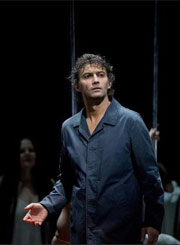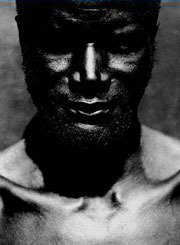Parsifal on the big screen

A sensational and star-studded new production of Wagner's final masterpiece, Parsifal, is the next title in the highly successful sixth season of The Met: Live in HD from The Metropolitan Opera in New York. This lavish performance will be screened exclusively at Cinema Nouveau and select Ster-Kinekor theatres countrywide.
Wagner's Parsifal is staged by the acclaimed French-Canadian director Francois Girard (The Red Violin) in this, his Met debut. Girard's timeless new vision for Wagner's final masterpiece explores the many facets of this mystical score, while designer Michael Levine (Eugene Onegin) creates a surreal landscape that goes to the extreme with 1200 gallons of blood covering the stage during the dramatic second act.
Girard, who has done acclaimed work in film, theatre and opera, presents Parsifal in a post-apocalyptic setting. Two barren, sun-baked, dirt-gray mounds are divided by a riverbed with just a trickle of flowing water, sometimes thick with blood. In the background videos depict dark clouds, swirling mists and, sometimes, cosmic images of strange solar systems and ominous planets.
The extraordinary cast of Wagnerians assembled for the deeply meditative opera about sin, redemption, pain, and healing features enigmatic German tenor Jonas Kaufmann in the title role, with German bass Rene Pape as the wise knight Gurnemanz, Swedish soprano Katarina Dalayman as the wayward temptress Kundry, Swedish baritone Peter Mattei as the wounded King Amfortas, and Russian bass-baritone Evgeny Nikitin as the evil wizard Klingsor.
Italian maestro Daniele Gatti conducts Wagner's powerful and complex score. American bass-baritone Eric Owens hosts the transmission and conducts backstage interviews with the stars.
Wagner did more than any other composer in the 19th century to change the way that people listened to opera. In the 18th century people went to the opera house and sat in their boxes to chat to other people and be seen. Composers wrote operas with big arias, which allowed the singers to show off their skills and make the audience applaud.
Wagner changed all this. He soon developed operas in which there is no difference between recitative (where the story is told) and arias (big songs for the soloists). The music of his later operas, especially Parsifal, is like a long, continuous line with rich, romantic harmony. The music develops logically, with leitmotifs (musical ideas that represent particular people or ideas), which help the music and the story to develop.
Rich in allusions and symbolism, Wagner dug into German and Christian legends and, in his inimitable fashion, created in Parsifal an allegory of the conflict between Christianity and paganism, good and evil, light and dark, physical passion and spiritual abstinence.
Be prepared for an emotional high as the running time of this not-to-be-missed production of Parsifal is approximately five hours, 30 minutes (including intermission).
Parsifal will be screened from 6 April for two weeks. Go to www.sterkinekor.com for screening times and bookings.

Cape Town Opera's new production of Verdi's Otello, known as the greatest of all Italian tragic operas, celebrates the Verdi bicentenary.
Lithuanian tenor Kristian Benedikt sings the formidable title role, with Ferrier Prize-winning South African soprano Sarah-Jane Brandon returning from London to make her role debut as Desdemona. George Stevens brings one of his signature roles, Iago, to Cape Town for the first time, while Brad Cohen leads the Cape Philharmonic Orchestra through Verdi's astonishing score. Festering jealousy, relationship and rank play out in this gripping new production.
"The concept was based on finding a setting that created a closed and claustrophobic world in which the intense psychodrama could play out. I wanted the sense of the military to be tangible, so that Otello's status as a "warrior" was immediately contextualised and his recourse to violence as a solution more understandable," said director Simon Phillips.
"I was interested in images of warfare that would make an immediate connection to a modern audience. Therefore, although the presence of water makes Iraq as an actual setting impossible, I wanted some imagery from that conflict to be hinted at and a sense of the Middle East as the invaded territory." Phillips was also interested in the amount of "surveillance" in the piece. The spying scenes are supported by a sense of close-circuit cameras and the action being watched on screens and via headphones as much as in the flesh.
"The design is rich in atmospheric verismo and detail, with quite a filmic quality, but, of course, overall it's a necessary distillation/stylisation, allowing us to vary the playing spaces without monumental movement of scenery."
Otello is on at the Artscape Opera for four performances only on 6, 9, 11 and 13 April. Booking is at Computicket or Artscape Dial-a-Seat +27 (0)21 421 7695.
